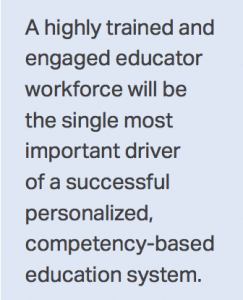Modernizing Educator and Leader Development for a Next Generation Workforce
Education Domain Blog
A highly trained and engaged educator workforce will be the single most important driver of a successful personalized, competency-based education system. Educators and leaders will take on new roles as they work individually and collectively to design customized pathways to graduation for every student. Many will require new skills to adapt instruction for students with varying levels of competency and interests. This will require significant changes to pre-service preparation, professional development, and evaluation frameworks to ensure educators have the support and resources to make this transition.
Until recently, federal teacher requirements focused almost exclusively on input-based credentials like Highly Qualified Teacher (HQT). HQT provisions were repealed with the passage of the Every Student Succeeds Act (ESSA)—an important first step. It will be up to the states to lead the critical next step: shifting the focus to educator competencies as the basis for credentialing on demonstrated outcomes, rather than on time-based inputs. A new program in ESSA would enable flexibility to implement new teacher and leader preparation program models. This provision, stemming from the stand-alone bill the GREAT Act, calls for the creation of teacher and principal “academies” with provisions such as:
(ESSA)—an important first step. It will be up to the states to lead the critical next step: shifting the focus to educator competencies as the basis for credentialing on demonstrated outcomes, rather than on time-based inputs. A new program in ESSA would enable flexibility to implement new teacher and leader preparation program models. This provision, stemming from the stand-alone bill the GREAT Act, calls for the creation of teacher and principal “academies” with provisions such as:
- Rigorous selection in admissions to get the best and brightest into the schools where they are needed most;
- Emphasis on clinical instruction in preparing teacher and principal candidates;
- Graduation tied to improving student academic achievement; and
- Programs that fail to produce great teachers or principals will be not be reauthorized.
According to EdWeek, the idea behind these programs is “academies will be free from burdensome, input‐based regulations that are unrelated to student achievement.”
We think professional learning for educators should model competency-based learning environments with demonstrated performance and outcomes, and teachers should also experience powerful, personalized learning experiences generating evidence of success with exhibitions and e-portfolios.
New talent and leadership development pathways are necessary to help to build strong pipelines of bold, visionary and capable school and district leaders to catalyze the transformation to next generation learning.
Recommendations
- Support the development of educator and leader evaluation systems that focus on competency to teach and lead in personalized learning environments.
- Provide incentives for educator and leader preparation programs to align curricula and completion requirements with the expectations of a competency education system.
- Prioritize the use of professional development funds to prepare and support educators and leaders for personalized and competency-based learning environments.
- Allow states flexibility to define what it means to be an effective educator.
What recommendations would you provide federal policymakers? Please comment or tweet us here: @nacol.
- Download Laying the Foundation for Competency Education: A Policy Guide for the Next Generation Education Workforce
- Attend The iNACOL 2016 Blended and Online Learning Symposium
- Watch The Every Student Succeeds Act—How Will the New Federal K-12 Education Law Support Personalized Learning?
- Read Modernizing Educator and Leadership Development for Student-Centered Learning
- Engage by tweeting with #ESSA, #edpolicy, #teacherPD and #leaderPD.